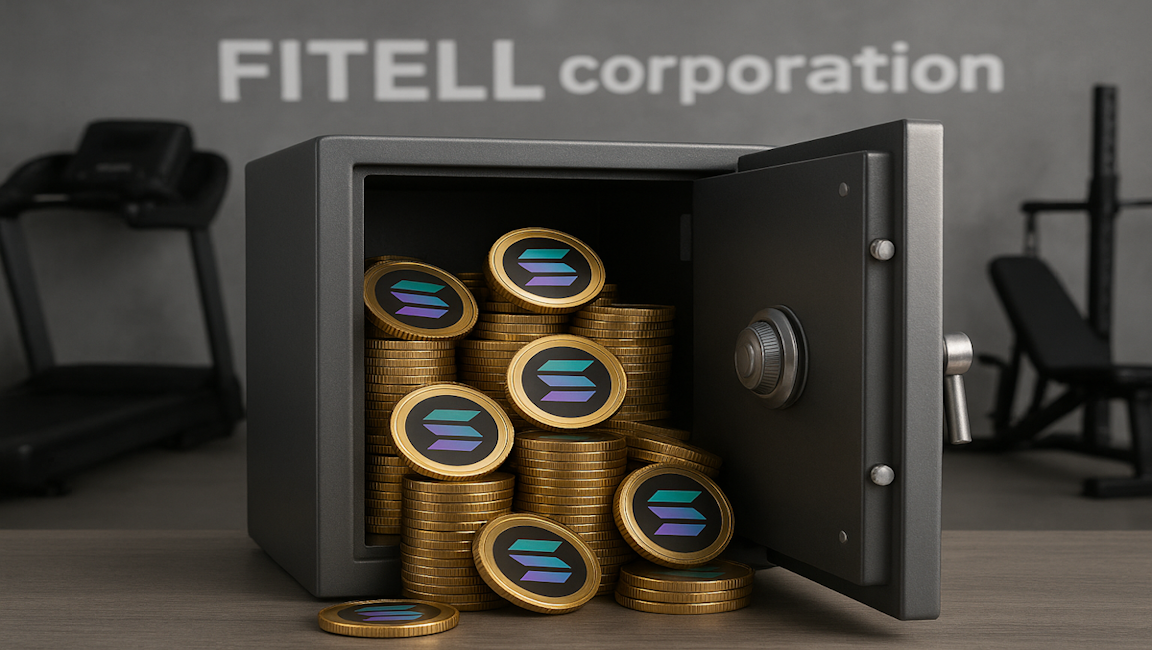Shares of Australian fitness equipment maker Fitell Corporation (Nasdaq: FTEL) have experienced a dramatic surge and subsequent drop following the company’s bold pivot into cryptocurrency.
The company, traditionally known for its online retail of gym and fitness equipment through its subsidiary GD Wellness, made headlines after announcing a strategic move to build a Solana digital asset treasury, a first for an Australian firm.
Fitell’s $100M Solana (SOL) bet
Fitell stunned the market on Wednesday by revealing that it had secured a $100 million financing facility to build a Solana-focused treasury.
After the closing of the deal, $10 million was immediately deployed to purchase 46,144 Solana (SOL) tokens. This decision was accompanied by a planned rebrand into “Solana Australia Corporation,” signaling a complete shift in identity from fitness equipment supplier to digital asset treasury operator.
The company explained that the Solana purchases were not a one-off. Instead, it intends to use up to 70% of proceeds from future closings of its credit line to expand its holdings of SOL.
Fitell’s leadership argued that this approach would allow it to generate new streams of revenue by staking and deploying assets across structured products, on-chain liquidity strategies, and yield-focused opportunities. Advisers such as David Swaney were brought in to design models capable of optimizing returns while limiting downside exposure.
Crypto strategy meets traditional skepticism
While Fitell’s management described the Solana bet as forward-looking and a potential blueprint for digital asset ETFs, investors were far less enthusiastic.
The company’s sudden departure from its core business of fitness equipment retailing raised questions about execution risk and financial sustainability.
Analysts have long flagged the business as overvalued and underperforming, and many shareholders appear unconvinced that plunging into volatile cryptocurrencies could solve those underlying issues.
Adding to the unease, Fitell disclosed that its stock had already fallen by more than 95% earlier in the year, following steep selloffs triggered by weak financial performance, and the Solana strategy looks more like a desperate attempt to reinvent the company than a carefully calculated growth plan.
FTEL stock pumped and dumped
The company’s stock initially rallied as much as 50% on the announcement, climbing to $13.63, but optimism was short-lived.
After the initial rally, Fitell stock began to tumble once investors digested the details of the treasury pivot and by the close of trading on September 24, FTEL was down 21.39%, ending the session at $6.65 after heavy intraday swings between $6.22 and $7.59.
Market data from Yahoo Finance showed an unusually high trading volume of 438,429 shares, well above the average of 81,143. But the company’s market capitalization shrank to just $8.7 million, underscoring how quickly enthusiasm evaporated.
Notably, the selloff mirrored declines at other companies that had recently allocated large sums to crypto, including Helius Medical Technologies, CEA Industries, and BitMine Immersion.
Why the Fitell stock price is dropping
The decline reflects both skepticism of the strategy and persistent concerns about the company’s fundamentals. Fitell’s earnings remain negative, with a trailing twelve-month loss per share of -7.84. The lack of profitability and cash flow pressure makes the pivot into a high-risk asset class even harder to justify in the eyes of cautious investors.
The firm also announced a one-for-sixteen share consolidation, set to take effect in September 2025, to maintain compliance with Nasdaq’s minimum bid requirements. While the move may prevent delisting, it highlights the fragile state of the business.
Shareholders are aware that consolidations often fail to mask deeper issues, and many worry that Fitell’s underlying fitness retail operation has been overshadowed by its speculative Solana venture.
In a nutshell, while Fitell insists that building a digital asset treasury will create long-term value by capturing yield opportunities beyond simple staking, investors remain unconvinced. Until the company can demonstrate sustainable profitability and prove that its Solana bet can deliver stable returns, Fitell’s stock is likely to stay volatile and under pressure.

